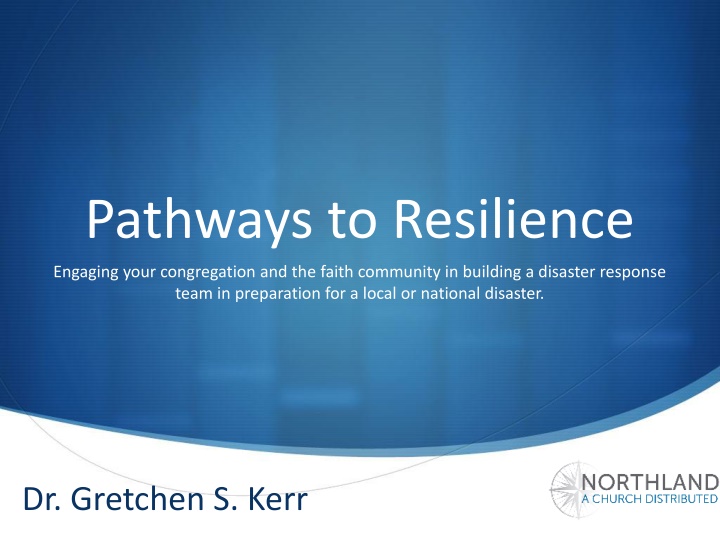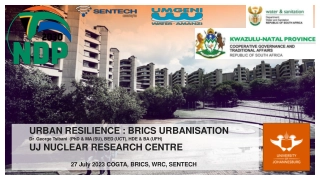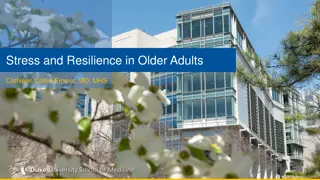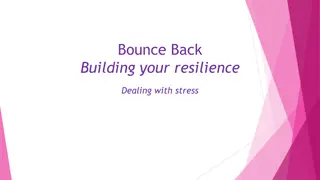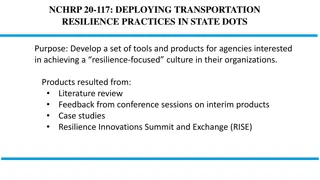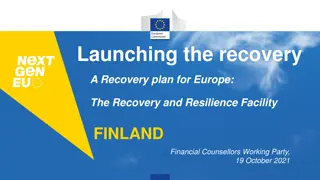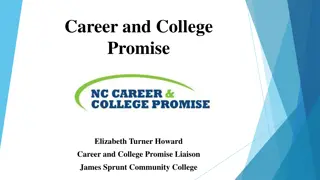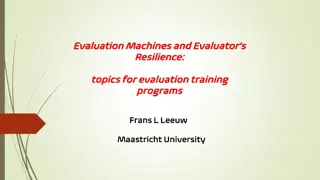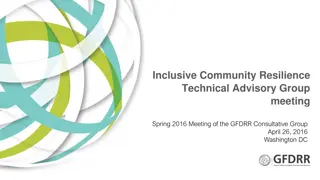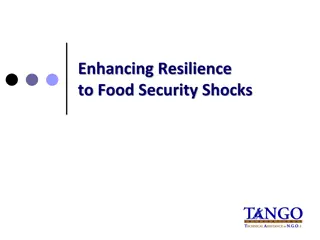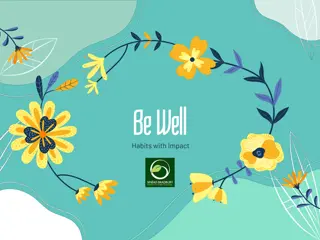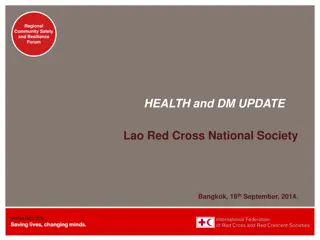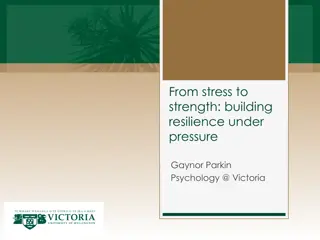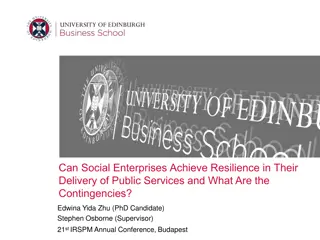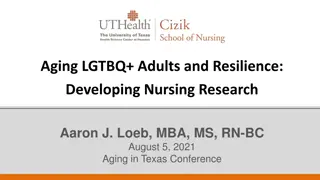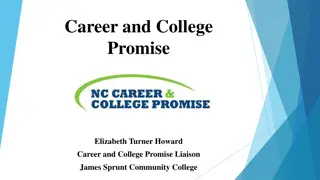Pathways to Resilience
This content discusses pathways to resiliency by engaging congregations and faith communities in building disaster response teams for local or national disasters. Dr. Gretchen S. Kerr emphasizes the importance of emotional and spiritual support, along with key strategies and milestones for effective disaster response efforts.
Download Presentation

Please find below an Image/Link to download the presentation.
The content on the website is provided AS IS for your information and personal use only. It may not be sold, licensed, or shared on other websites without obtaining consent from the author.If you encounter any issues during the download, it is possible that the publisher has removed the file from their server.
You are allowed to download the files provided on this website for personal or commercial use, subject to the condition that they are used lawfully. All files are the property of their respective owners.
The content on the website is provided AS IS for your information and personal use only. It may not be sold, licensed, or shared on other websites without obtaining consent from the author.
E N D
Presentation Transcript
Pathways to Resilience Engaging your congregation and the faith community in building a disaster response team in preparation for a local or national disaster. Dr. Gretchen S. Kerr
Ministry Areas Disaster Response Prison and Jail Transition 121Hope (anti-human trafficking) Homeless Initiative LifeHope holistic care of the congregation and community in time of need. University of Central Florida Masters Social Work (10 clinical interns) VISTA (Volunteers In Service To America) Service projects Dr. Gretchen Kerr Executive Director, Compassion And Reconciliation (CARe) Center Longwood, FL.
FBO emotional and spiritual teams provide services which can lower levels of anxiety and depression Resilience FBO Organizations Provide: Positive world view Personal empowerment Sense of control Guidance in decision making Social support The capacity to recover quickly from difficulties, toughness These are ALL critical resources of community resilience in aftermath of disaster.
Lessons Learned Start Small Reflect your DNA Partner Partner Partner Go where called Their agenda not yours
Start Small The History of Northland s Disaster Response Team
Response: 2004 - present Local & National Response Our Community Response 8/2005 Hurricane Katrina 8/2004 Charlie, Francis & Jeanne 9/2005 Hurricane Rita 2/2007 Lake County tornado (21 deaths) 1/2010 Haiti Earthquake (5 months) 4/2011 Pleasant Grove, AL. tornado 8/2008 TS Fay (local flooding) 4/2011 Tuscaloosa, AL. tornado 6/2012 TS Debby, Live Oak, FL. 10/2012 Hurricane Sandy, Far Rockaway, NY. 5/2013 Moore Ok, tornado
Major Ministry Milestones CERT, Began Regular Training Process And Events To Train 26 Mobile Kitchen arrives Travel out of state to Major events Aware of and called to Local events Develop Structure Deploy Forms and Process, Required Deploy training Begin journey Of responding To local and National disasters Develop Local Partnerships With Emergency Management & Community Partners
Small Humble Beginnings 2004 2007 ministry was in the formative stages Katrina response (2005) Early beginnings of formative ministry Congregation supported through contributions Teams sent to assist in with rebuilding Partnerships develop 2010 Haiti Earthquake Partnered with other organizations Formalized deployment, training, credentialing Deployed 50 team members over 5 months
Start small; grow as God leads 2004 partnered with others using equipment 2005 trailer for building in Gulfport, Al New Orleans, LA 2007 donated 2nd supply trailer RBHAT ESF8 following Haiti 2010 CERT members 2012 Purchased mobile kitchen (borrow truck to pull it) 2013 added large supply trailer 2014 Leased truck
Reflect Your DNA The History of Northland s Disaster Response Team
Understand your niche Started by partnering with others responding as needed, often in cleanup phase. Developed experienced teams (over time). Shelter Management teams to support our local high school (Red Cross) Created teams to support EM POD s at Local malls. The National Guard respond during 1st 72 hours, then our teams would take over. Took on new members and partner with experienced professionals (multiplication). Eventually transitioned from responding 2-4 weeks following event into more immediate responders . New niche, were able to roll equipment within 24 hours stay onsite until community stabilized (typically 14-18 days).
How to Build a team? Slow and steady Annual events to raise awareness and recruit Disaster Response Awareness day (May prior to hurricane season) Local outreach events used as training for teams Orlando International Airport Full scale event mobile kitchen Local organizations events Community block parties mobile kitchen provides food
Team Development Monthly pot luck meetings fellowship, training, information sharing Skills Course two sections offered twice a year. Each member must review each year. Provides level of commitment CPR Disaster Response team provides training (licensed under City of Orlando Fire Department) Child Care workers All Disaster team members Community members Congregation members
Partner Partner Partner The History of Northland s Disaster Response Team
Community Partners Local Emergency Management (County, City) Seminole County Long term recovery organization Tri-County VOAD City of Orlando EM CERT training, weather spotter, 311 operator training, CPR certification (in house) Other Faith groups Train with us, serve on our teams, deploy with us Share resources and network with other churches
Awareness Build a Kit WESH 2 Meteorologist Amy Sweezy guest at event Kids received instruction on all items Visit tables, answer questions on item, put in bag to create family kit Fun, food, entertainment
Go Where Called The History of Northland s Disaster Response Team
Patience Ministry philosophy DR@N (Disaster Response at Northland) team is made up of various levels of trained congregants. All are welcome at all levels Team spans experience levels from within congregation: fire chiefs and professionals Restaurant professionals; chefs Construction workers, mental health professionals, etc.
Teams based on skills Kitchen Team Food Handlers certification, Kitchen manager certification Emotional and Spiritual Care team Psychological First Aid, NOVA, CISM trained Equipment & Debris Removal team Medial team (professionals) Behavioral Health Assessment team (Dept. of Health) Pet Care
Deployment Deployment based upon being invited to assist. Priority given to requests from churches in effected areas. All team members understand the idea of spontaneous volunteers we only serve as a deployed team. Basic FEMA classes required for deployment (IS100, 200, 700, 800). Teams understand common language, chain of command, etc.
Reflect Their Agenda: not yours The History of Northland s Disaster Response Team
Our Team Guidelines Assist the host site as needed Train and educate if needed, we want to empower them to multiply their skills in the future Set up procedures they can maintain after we leave (our stay is 10-14 days) Show Hospitality and respect for host locations We are there to serve our host site (not the other way around), they have just experienced trauma Each deployed team member is screened, background check, application on file and completed an interview process.
Ah, ha moment May 2013 Moore, Oklahoma
Moore, Oklahoma Tornados hit at 3:00pm Received the call at 7:00pm to come and assist (former staff member knew the equipment we had and work we did) Trailers on the road in the morning, Advance team flew out next morning, arriving mid-day This is what we saw when we arrived .
Realization When we arrived, 500+ volunteers were already on site Mountains of supplies were arriving By day 2 tractor trailers of supplies were arriving By day 3 they were overwhelmed with phone calls By day 4 structure was settling in with the help of teams coming from the outside Every room in the sanctuary was filled with supplies or people Sunday was coming ----- church!!!
Coordinated Plans Developed an in-house local disaster response plan Guidelines for safety planning for congregants and staff already in place Summary of plan (assuming similar event as in Moore) Facilities Department IC Disaster response team Logistics Volunteers Volunteer Reception Center (for our congregants/volunteers) Point of Distribution (on site) Work orders and response to needs of congregation/community Debris removal, tarps, etc.
Contact Information Dr. Gretchen Kerr Northland, A Church Distributed Gretchen.kerr@northlandchurch.net Office: 407-949-7190
